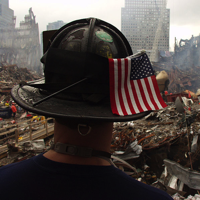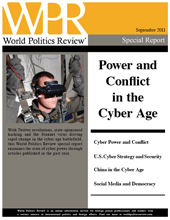I had the pleasure of participating in France 24’s panel discussion program, The World This Week, on Friday. The program focused on the impact of Sept. 11 on America and the world over the past decade. The other guests were Ahmed Rashid, Newsweek’s Christopher Dickey, the IHT’s Eric Pfanner, Nooshabeh Amiri and France 24’s Loick Berrou. Part I can be found here. Part II can be found here. I was especially struck by Eric Pfanner’s observation that this is the first Sept. 11 anniversary where we can consider its impact from the perspective of historic closure. The anniversary has already […]
The Americas Archive
Free Newsletter

The 10th anniversary of the Sept. 11 terrorist attacks has garnered America almost as much schadenfreude from the world as the original events did. Back in 2001, the line was that we had it coming to us for lording it over the world since the Cold War’s end. Today, it takes the form of writing off our alleged “hegemony” in light of the shifts in global power over the intervening decade, a claim that is as absurd the previous one was insulting. Naturally, the Chinese are celebrated as our presumed replacement. So, as always throughout our history as a superpower, […]
In thinking about the ways in which Sept. 11 and our responses to it changed America and the world, it’s important to remember that some of its impact, and perhaps the most historically significant aspects of that impact, may not have entirely emerged yet. In August 1945, for instance, while the advent of radar, jet technology and nuclear weapons were plainly evident, it would have been close to impossible to foresee the way in which the war effort, both domestically and in theater, would go on to inform the black civil rights movement and women’s liberation movement 20-25 years later. […]
Mozambique recently offered Brazilian farmers 15 million acres of farmland at a symbolic price to be used for the production of soy, corn and cotton. In an email interview, Adriana de Queiroz, an executive coordinator at the Brazilian Center for International Relations (CEBRI) who writes in a personal capacity, discussed Brazil-Africa relations. WPR: What are the main countries and sectors for Brazilian investment in Africa? Adriana De Queiroz: Brazilian companies have been investing mainly in mining, infrastructure and oil and gas in Africa. A significant proportion of this investment has been in Portuguese-speaking countries, such as Angola and Mozambique. Brazilian […]

Editor’s note: This is the second in a two-part series on the impact of Sept. 11 on U.S. foreign policy. Part I examined the militarization of U.S. foreign policy following Sept. 11. Part II examines ways to reverse this trend. After the debacles of Iraq and Afghanistan, the United States should be contemplating a future of military restraint and foreign policy modesty. Moreover, with potentially painful cuts on the horizon for the Defense Department, the time has come for the armed forces to do less and for other agencies to pick up the slack. But that doesn’t appear to be […]
A recent uptick in attacks on Colombia’s energy infrastructure, along with a 25 percent increase in kidnappings, has prompted speculation about whether major security gains made in the country over the past decade may be deteriorating. While the current spate of violence pales in comparison to the bloodshed that burdened Colombia through the 1990s and early 2000s, according to Michael Shifter, who heads the Inter-American Dialogue in Washington, the recent attacks could create serious political challenges for Colombian President Juan Manuel Santos. Shifter reminded Trend Lines on Thursday that upon succeeding Álvaro Uribe as president of Colombia last year, Santos […]

Editor’s note: This is the first in a two-part series on the impact of Sept. 11 on U.S. foreign policy. Part I examines the militarization of U.S. foreign policy following Sept. 11. Part II will examine ways to reverse this trend. On Sept. 11, 2001, nearly 3,000 Americans were killed in the single deadliest terrorist attack in American history — the work, not of a foreign army, but of al-Qaida, a nonstate actor. The U.S. wasted little time in responding. The Taliban government in Afghanistan that had provided safe haven for the terrorist group was quickly deposed by a combination […]

With Twitter revolutions, state-sponsored hacking and the Stuxnet virus driving rapid change in the cyber-age battlefield, this World Politics Review special report examines the state of cyber power through articles published in the past year. Below are links to each article in this special report, which subscribers can read in full. Not a subscriber? Purchase this document for Kindle or as a PDF from Scribd. Or subscribe now. Cyber Power and Conflict Power in the 21st CenturyBy Joseph S. Nye, Jr.March 22, 2011 Evolutions in Asymmetric CyberpowerBy Chris C. Demchak April 19, 2011 Re-Categorizing Cyber ConflictBy Eric Sterner July 8, […]

In 1903, the novel “Riddle of the Sands” was published to great acclaim in the United Kingdom. Written by Erskine Childers, the novel told the story of a secret German invasion flotilla prepared to overrun Great Britain. The best of a large genre of “invasion literature” warning in dire terms of the threat that Kaiserine Germany posed to the British Empire, “Riddle of the Sands” apparently helped convince First Lord of the Admiralty Winston Churchill to reposition the Royal Navy to northern bases, safe from German attack. In a paper presented at the 2011 American Political Science Association conference, Dr. […]
Canadian Prime Minister Stephen Harper toured Latin America last month, stopping in Brazil, Colombia and Honduras. In an email interview, James Rochlin, a professor of political science at the University of British Colombia, discussed Canada-Latin America relations. WPR: What is the recent history of Canada’s diplomatic relations with Latin America (excluding Mexico)? James Rochlin: Canada began to look seriously at Latin America during the 1970s with Prime Minister Pierre Trudeau’s “Third Option” policy, an attempt to diversify trade away from the United States when the United States first appeared to be facing a relative global decline. Canada joined the Organization […]
